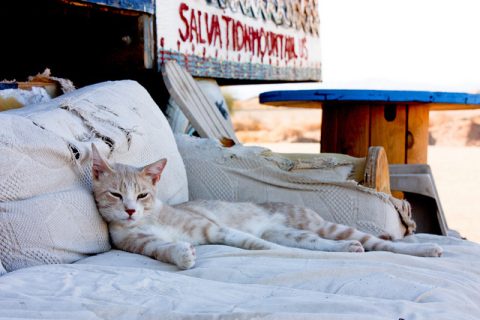The first time I read your story, I was struck by how sad it made me feel—that’s a great accomplishment in such a short space. But there’s also humor, like when the spirits recall undesirable elements of the physical world (migraines, tofu cooked by well-meaning vegetarian friends, Judge Judy, not-so-flattering mirrors). Talk about how you achieved balance between the sad and the humorous. Can one exist without the other?
Even though this story is titled “The Sadness of Spirits,” I wasn’t really thinking about the balance between humor and sadness when I started writing. First lines are often what inspire my stories and this one was no exception. I began exploring what it would be like for spirits to gather around a Ouija board. Why would they be there? What would their lives be like as spirits? From there humor and sadness just felt natural because our lives are often a balance of the two, or at least that’s what I like to believe. We might spend much of our lives peering into unflattering mirrors or struggling to hear a silent almighty, but at least we can laugh about it.
Have you ever tried Ouija?
I was always taught that Ouija boards are bad news, especially if you don’t want to be possessed Exorcist-style, and so I’ve spent much of my life avoiding them. I vaguely recall using one during a Girl Scout outing, but I think I’ve blocked that experience from my memory because I don’t remember it well. I do enjoy reading Tarot cards though.
Even though they push and elbow one another for prime closet space, the spirits are friendly—one even spells it out. They’re re also sensual in the way they cling, vibrate together and apart, drape, encircle. How did you arrive at these details?
I really just tried to imagine what a spirit’s life would be like. These spirits are just people with perhaps a bit more knowledge and time on their hands, so why wouldn’t they be friendly and polite when the occasion calls for it? Also, spirits would be free of their bodies, which would allow for the draping and encircling that takes place. They get to be buoyant in a way they never were when they were alive. They also wouldn’t be able to grasp in the way that living people can and so encircling with their energy would be the next best thing.
Did you know “The Sadness of Spirits” would be flash fiction? Do you (does anyone?) ever know exactly how short or how long a piece is going to become?
I can’t really speak for other people, but I generally know how long a story will become when I first start writing. Often my really short stories show up uninvited when I’m working on something longer and running into problems. I’ll be writing and thinking and then this completely unrelated first sentence pops into my head and it’s usually so interesting that I have to drop everything and write about it. This is probably my brain’s way of procrastinating on the longer pieces or escaping what it sees as a losing situation, but the stories are often short and fun to write. On the other hand, I can usually tell by the end of the first paragraph if a story is going to be much longer. There’s so much more to unpack and explore from the very beginning.
If someone told you, “I love your piece, and I think it would make a terrific longer story / novel / movie,” would you consider the suggestion, or would you stand your ground? I tend to bristle if someone suggests I’ve written a story in the wrong form, so I’m curious about other writers’ takes on this.
I would definitely consider the suggestion. I think readers can often see possibilities that writers are blind to, and if someone truly thought this story could be a longer story or a novel I would be interested in at least listening to their ideas. As for this story being a movie, royalties aside, I would love to see how the spirits are portrayed on the big screen, especially if they turned out to be very different from how I imagined them. I would also drag everyone I know to the movie theater over and over again in an obsessive way, so great would be my enthusiasm, and that would probably put a lot of strain on my relationships. So it’s probably better that this story remain a work of flash fiction.



 The core workshop of SmokeLong Fitness is all in writing, so you can take part from anywhere at anytime. We are excited about creating a supportive, consistent and structured environment for flash writers to work on their craft in a community. We are thrilled and proud to say that our workshop participants have won, placed, or been listed in every major flash competition. Community works.
The core workshop of SmokeLong Fitness is all in writing, so you can take part from anywhere at anytime. We are excited about creating a supportive, consistent and structured environment for flash writers to work on their craft in a community. We are thrilled and proud to say that our workshop participants have won, placed, or been listed in every major flash competition. Community works.